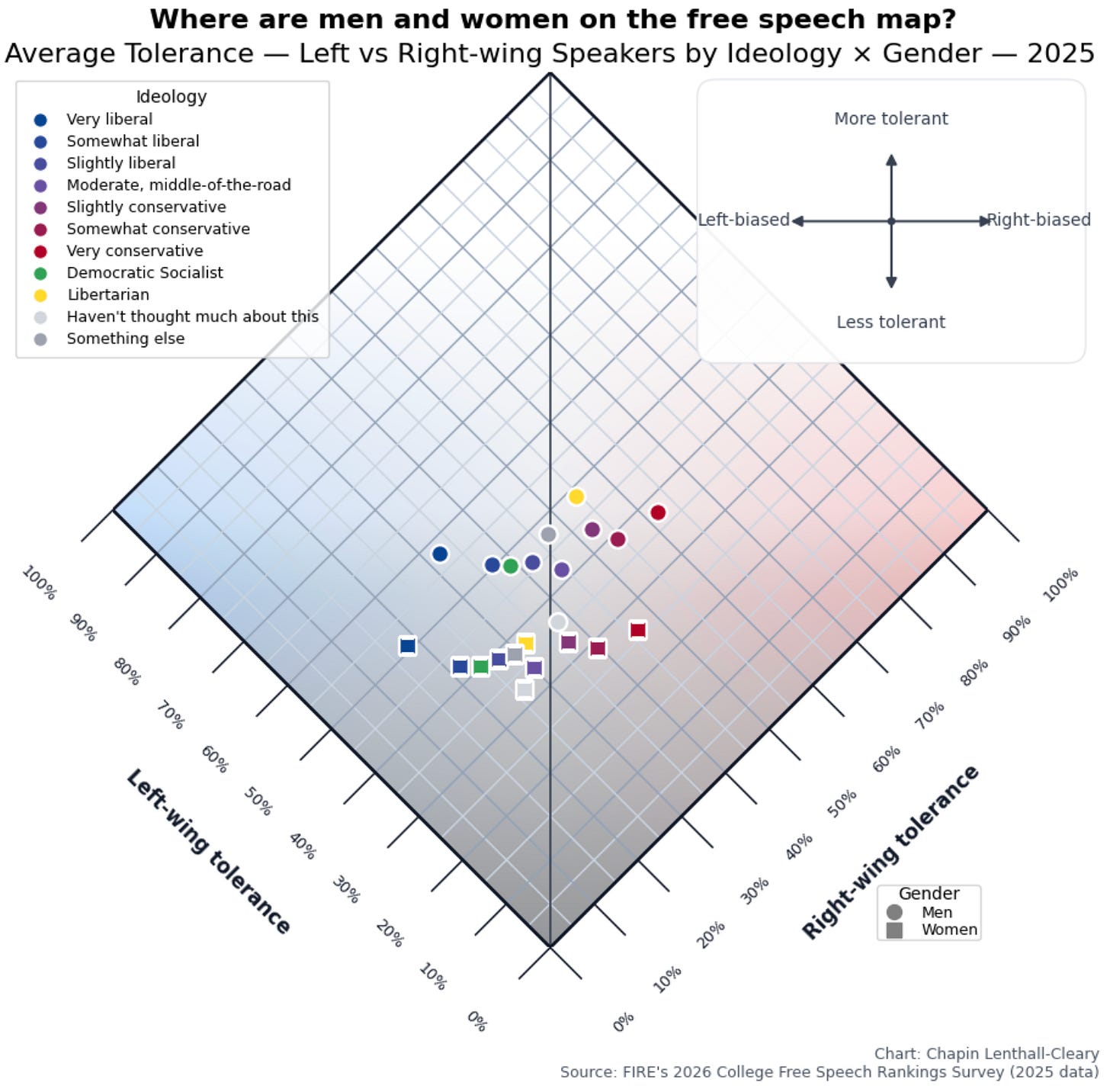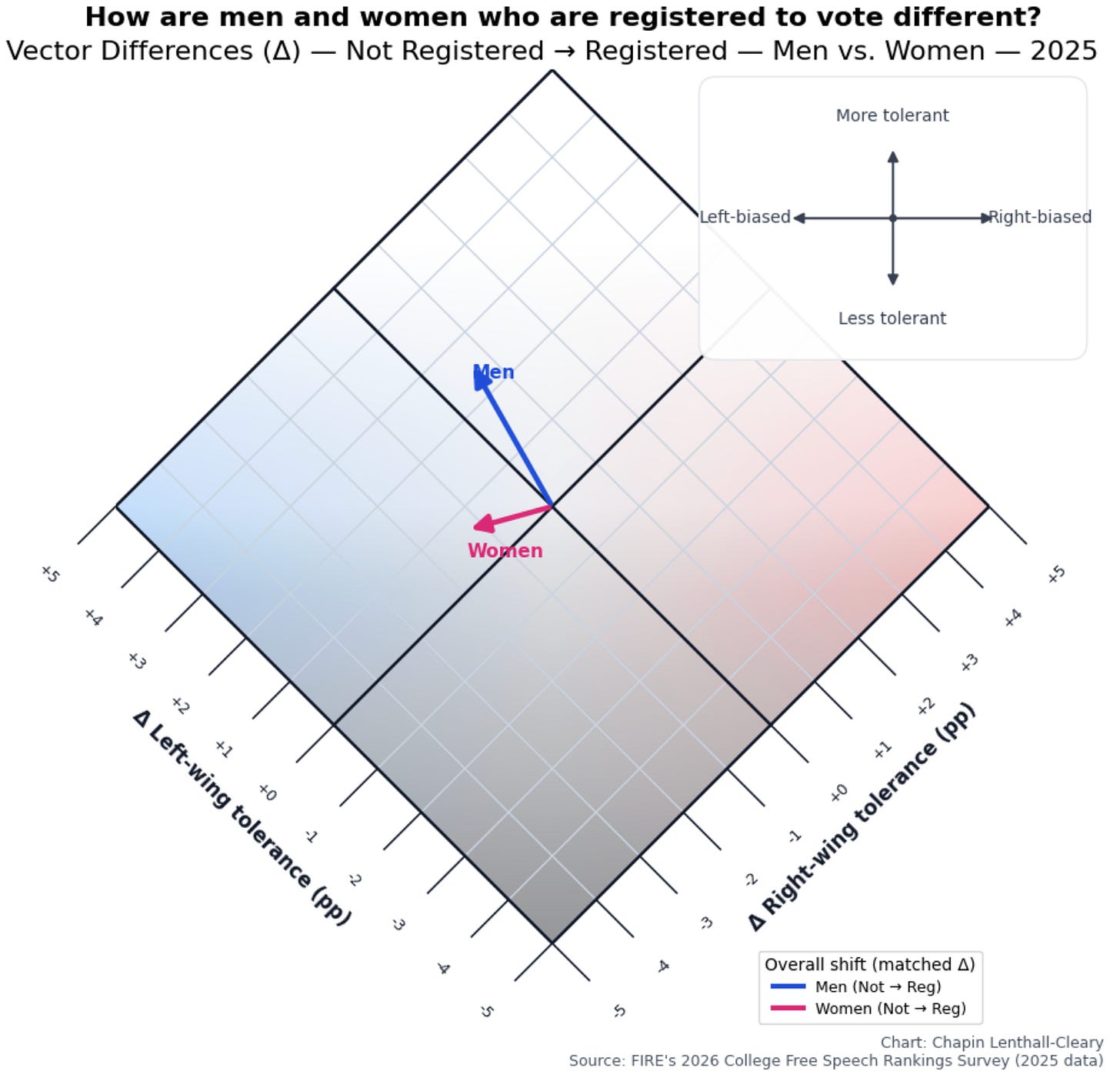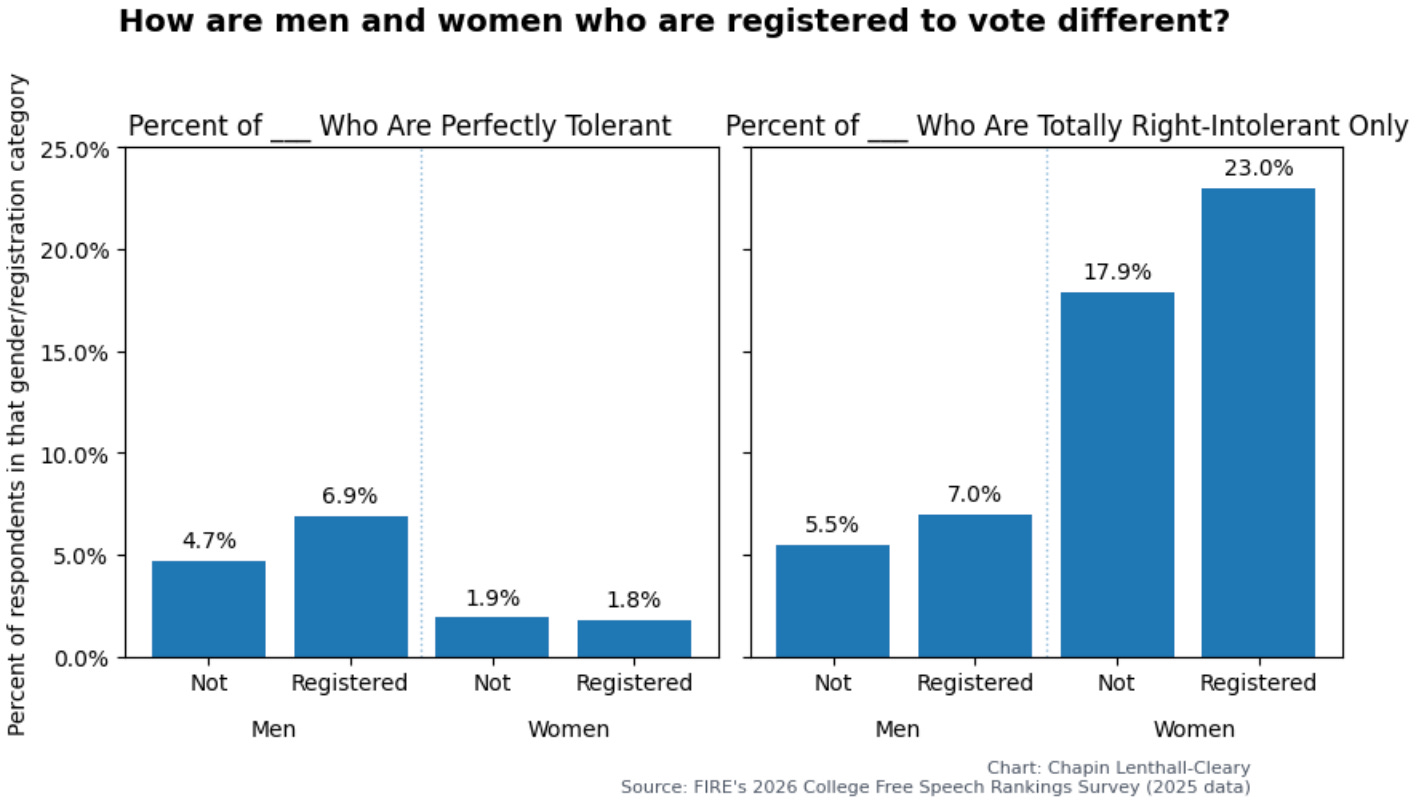Voting is tied to more tolerance in men — but less in women
Data shows how being registered to vote correlates with political tolerance
This post builds on a previous one about gender and tolerance, so I recommend starting there if you haven’t already read it.
We’ve already seen that when we ask students whether they’d allow controversial speakers on campus, men are far more tolerant. In fact, men are often more tolerant of speakers from the opposite side of the political spectrum than women are of their own side. That’s pretty wild. So the natural question is, what else drives tolerance? Even better, is any of it something we could actually influence?
One candidate is political engagement. FIRE’s College Free Speech Rankings ask students whether they’re registered to vote — so we can check whether that lines up with tolerance. And the answer is…strangely, yes. But not how anyone might think. For men, being registered to vote is associated with higher tolerance. For women, it’s associated with lower tolerance.
That brings us back to the map from the earlier post. This is that same map — just rotated and reversed so the pattern is easier to see. As before, there’s a large tolerance gap between men and women:
To show differences between men and women who are registered to vote and those who aren’t, we’ll use something called a vector difference plot. Think of it as drawing arrows that represent how people move on the free-speech map when we go from looking at those unregistered to vote to those that are registered. The arrows all start from the center so you can compare their directions and lengths directly. In short, these arrows capture the impact of being registered on men’s and women’s positions in the free-speech landscape. They aren’t showing how tolerant men and women are, just the difference in tolerance between registered and unregistered men and women:
Wow. Men who are registered to vote are, on average, more tolerant of both sides than those who aren’t. Women who are registered to vote are, on average, less tolerant than those who aren’t — namely less tolerant against the right.
For men, the boost in tolerance mostly comes from one place: registered men are a lot more likely to be “perfectly tolerant” — the folks who say they’d allow every speaker that we ask about, full stop. Those men registered to vote seem more likely believe in the principle of free speech for all. That relationship is inverted for women. Instead, being a registered female voter is related to being totally intolerant of the right specifically. Men see a bump in that zone too, but it’s much smaller — and still overshadowed by the much larger increase in men who are fully tolerant across the board.
Put together, this means that being registered to vote correlates with the free speech ideal for men and correlates with politically biased intolerance for women. We can’t make any causal conclusions here: it could be that political involvement changes tolerance differently across gender, or it could mean that differences in existing tolerance levels influence whether men and women register to vote.
If our goal is to grow support for free speech, more research is needed to better understand what correlates with and what causes tolerance. Would training in free speech, philosophy, or rational debate be of any help? What about stigmatizing being unwilling to engage in rational debate (and change your mind if the evidence demands)?
The problem may look intimidating, but there’s nothing here that says it can’t be fixed. If we want to correct our failures through open debate, we’ve got to understand the problem — and then get to work on fixing it.
Correction: A previous version of this post contained lines that unintentionally implied a causal relationship that the data does not support.







Huh. As a "radical moderate" lesbian, this explains why it's hard to find other politically active, moderate lesbians who are willing to disagree politically sometimes to date... They just don't exist! Ha! At least that means it's not my quirky sense of humor or love of Star Trek... Thank God! 😂
I' m a long-time (if minor league) financial supporter of FIRE. And Wendy Kaminer (who may well be an outlier in this context) is the reason I started supporting FIRE. (I'd love to hear from Ms. Kaminer on this issue - she has a deeper-than-average knowledge of the history of feminism (and anti-feminism) in this country)
That said, I think that FIRE's tag line ("Free speech makes people free") is nonsense. Free speech is a necessary but far from sufficient condition. As Simone Weil noted, rights listed on paper are nothing without the social context to support them (I'm not sure I'd go with her solution for creating the social context, but she makes a good point nonetheless).
Why are men more tolerant? My guess is that, despite significant advances for women, that men still hold more social capital and therefore feel less constrained and less frustrated then women. The theory mentioned in the previous piece ("women prefer social harmony") seems like a reasonable guess at a contributing factor - but probably not the whole picture. And no, I'm not one of those people who see power relationships in every interaction - although I might be, if I held less power.
Also (pet peeve), I hate this use of the word woke, although, as an advocate of the descriptive approach to lexicography, I'm somewhat resigned to it (see The Dispatch's piece on the origins https://thedispatch.com/article/the-origins-of-the-term-woke-had/ and my rant on this and related topics https://substack.com/@robertpraetorius282272/note/c-169242311 (I'll be very surprised if anyone follows that 2nd link but. . .if somebody does, I'd love to discuss it))